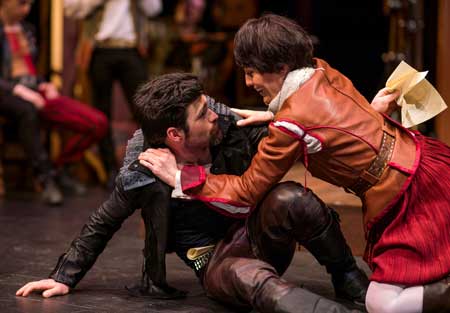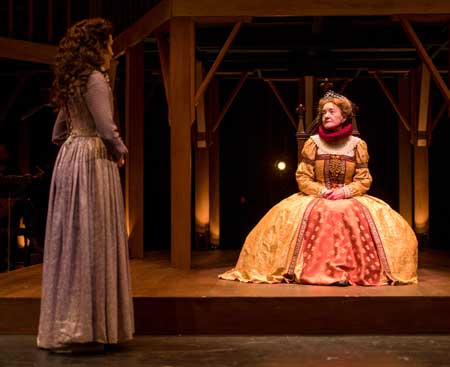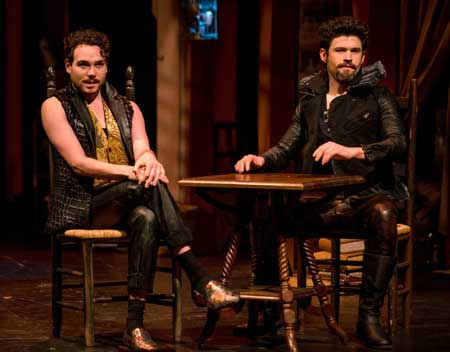Play
Based on the screenplay by Marc Norman & Tom Stoppard (1998)
Adapted for the stage by Lee Hall
Directed by Scott Edmiston
Speakeasy Stage Company
Boston Center for the Arts
South End, Boston
January 12 – February 10, 2018
Choreography/Period Movement: Judisth Chaffee; Fight Direction: Ted Hewlett; Scenic Design: Jenna McFarland Lord; Costume Design: Rachel Padula-Shufelt
With George Olesky (Will Shakespeare), Jennifer Ellis (Viola de Lesseps), Eddie Shields (Kit Marlowe), Nancy E. Carroll (Queen Elizabeth I), Ken Baltin (Henslowe), Remo Airaldi (Fennyman/Apothecary), Paul Alperin (Ensemble/Musician), Steve Auger (Ralph/Ensemble), Cameron Gosselin (Webster/Abraham/Ensemble/Musician), Jade Guerra (Mistress Quickly/Kate/Others), Jesse Hinson (Ned Allenyn), Jeff Marcus (Ensemble/Musician), Zaven Ovian (Ensemble/Various), Omar Robinson (Richard Burbage), Edward Rubenacker (Sam/Juliet), Carolyn Saxon (Nurse/Wench), Damon Singletary (Tilney/Sir Robert de Lesseps), Lewis D. Wheeler (Lord Wessex)

Jennifer Ellis as Viola
in “Shakespeare in Love”
Photo: Nile Hawver/Nile Scott Shots
Courtesy of Speakeasy Stage Company
Young Will Shakespeare (George Olesky) is having trouble coming up with plots, and Henslowe (Ken Baltin) the producer at the playhouse, is desperately in need of a hit to pay his bills. Shakespeare relies heavily on suggestions from his friend Kit Marlowe (Eddie Shields), but does not find inspiration until he encounters the beautiful and charming Viola de Lesseps (Jennifer Ellis). They fall in love, though the rules of the social game will forbid any enduring partnership. Nonetheless, the passionate romance provides the inspiration for some of Shakespeare’s great early works.
This story – Stoppard’s strongly embellished addition to literary history – is exactly the same as the one in the film of the same name (1998). It’s charming and inventive, and one who follows Tom Stoppard’s work would recognize it as one of his best scripts (alongside The Real Thing [1982] and Arcadia [1993]). It is the basis for a great film featuring Gwyneth Paltrow as Viola de Lesseps, Joseph Fiennes as Shakespeare, Judi Dench as Queen Elizabeth I, and a whole host of other great actors playing supporting roles.
So, turning this into a stage play raises some interesting questions. One imagines that part of the inspiration might be that Tom Stoppard is mostly a playwright not a scriptwriter. In this case he has written a filmscript that is every bit as good as some of his stage plays, so why not retrofit it to be a part of that corpus?
The result is something that is pleasant enough to watch, though one is inclined to wonder throughout why in fact the effort was undertaken to take a stellar film and do this to it.

Nancy E. Carroll as Queen Elizabeth I
in “Shakespeare in Love”
Photo: Nile Hawver/Nile Scott Shots
Courtesy of Speakeasy Stage Company
There are plenty of stage plays that are converted into films and sometimes the result is successful. Proof (2000) by David Auburn, currently having a run at Central Square Theater, is a great play and was made into a great film with – she’s everywhere -Gwyneth Paltrow – Anthony Hopkins, and Jake Gyllenhall. Going from stage to screen, in that case, made a lot of sense and worked well. The film version of Harold Pinter’s scathing play Betrayal (1978) was also made into a successful film in 1983.
Going the opposite direction, from film to stage, is harder. It’s now been done so many times for Disney musical films in order to produce blockbusters for Broadway, that that particular endeavor seems not to shock anyone at all anymore. There are, as well, various staged versions of old Hitchcock films that play upon some form of kitsch in order to make their presence felt.
In this case, the main question is why it was done and what it achieves over the film version.
Nonetheless, the current production itself is quite satisfying in many ways. The lead actors – Jennifer Ellis as Viola, and George Olesky as Will – are charming and engaging stage presences, and there is the added benefit that Ellis has a beautiful voice and gets to sing a few notes along the way.

George Olesky as Will Shakespeare
in “Shakespeare in Love”
Photo: Nile Hawver/Nile Scott Shots
Courtesy of Speakeasy Stage Company
The supporting cast is also very good. Notable in her supporting role as Queen Elizabeth I is Nancy E. Carroll, executing with her signature sangfroid style, a queen as elegantly and sharply austere as Judi Dench’s film rendition. As well, Eddie Shields’ outrageously foppish rendition of Christopher Marlowe is hilarious and effective. Ken Baltin does a finely boisterous job as Henslowe, the embattled producer.
Exceptionally good is the fight choreography which does, in fact, achieve something distinctive over the film version.
In this production there is some supporting music which is fine, but, frankly, the score for the film is so powerful and memorable that it seems that a production without it loses a lot in the bargain.
The result here is perfectly fine, and for those who love the film, kind of an interesting way to revisit it. It doesn’t really work as an independent artistic alternative to the film, but not offensively so. Oddly, the effort to go from film to stage can be much more difficult than going from stage to film and this effort to bring a stellar film to the stage, though heartfelt and appealing in its own ways, exemplifies those challenges.
– BADMan
Leave a Reply